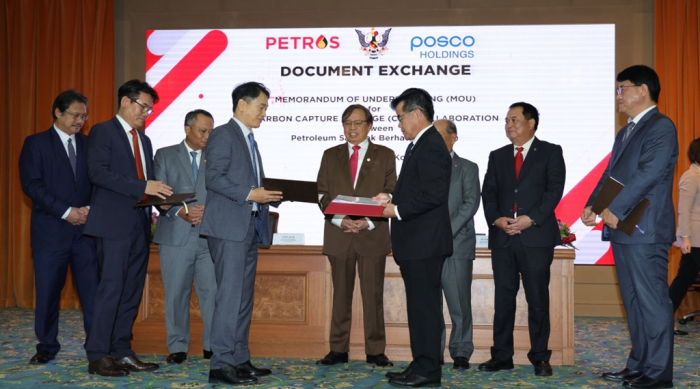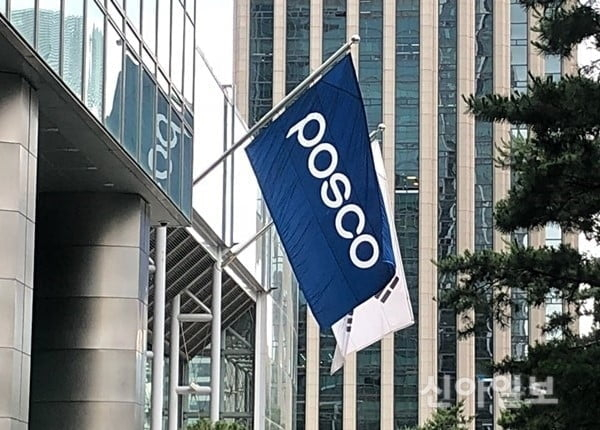Carbon neutrality
POSCO, Malaysia’s Petros to join forces on carbon capture business
The two sides will soon work out details such as carbon capture, transportation and construction of CCS facilities
By Dec 12, 2022 (Gmt+09:00)
1
Min read
Most Read
LG Chem to sell water filter business to Glenwood PE for $692 million


KT&G eyes overseas M&A after rejecting activist fund's offer


Kyobo Life poised to buy Japan’s SBI Group-owned savings bank


StockX in merger talks with Naver’s online reseller Kream


Meritz backs half of ex-manager’s $210 mn hedge fund



POSCO Holdings Inc., the holding company of South Korea’s top steelmaker POSCO, said on Monday it has joined forces with Malaysia’s energy firm Petroleum Sarawak Bhd to push ahead with a carbon capture and storage project in Sarawak, Malaysia.
POSCO International Corp., POSCO Engineering & Construction Co. and Petroleum Sarawak, more commonly known as Petros, have signed a memorandum of understanding on the CCS project, according to the Korean company.
Under the initial agreement, POSCO and Petros will conduct a feasibility study on carbon capture and storage at depleted underwater oil and gas fields off the coast of the Malaysian state of Sarawak.
Specifically, POSCO plans to collect carbon dioxide generated from its steel mills in Korea and the gas generated when blue hydrogen is produced, and send it to Malaysia for storage at the facilities.

TO LAUNCH WORKING GROUP SOON
POSCO and Petros will soon form a working group to outline detailed plans on carbon capture in Korea, transportation to Sarawak, CCS facility construction and carbon injection and storage at facilities.
“Through this cooperation, we expect to accelerate our goal of carbon neutrality,” said Cho Ju-ik, head of POSCO’s hydrogen business division. “The CCS business requires close cooperation between the government and companies. We expect active support from the Sarawak government.”
Anyi Ngau, chief of Petros Sarawak Resources Management Division, said, Sarawak has a geological structure suitable for carbon storage and the potential to promote CCS projects on a global scale.
In September, POSCO Holdings and two other Korean companies – Samsung Engineering Co. and Lotte Chemical Corp. – inked an initial agreement with Sarawak Economic Development Corporation Energy (SEDC Energy) on the Sarawak H2biscus Green Hydrogen Project.
Under the project, the four companies and Malaysia’s power authority plan to produce green hydrogen from 2027.
Write to Jae-Fu Kim at hu@hankyung.com
In-Soo Nam edited this article.
More to Read
-
 EnergyPOSCO International to invest $2.6 billion in energy operations
EnergyPOSCO International to invest $2.6 billion in energy operationsNov 04, 2022 (Gmt+09:00)
3 Min read -
 Carbon neutralityKorea's POSCO gets greener via integrated CO2-free brand
Carbon neutralityKorea's POSCO gets greener via integrated CO2-free brandNov 02, 2022 (Gmt+09:00)
1 Min read -
 Carbon neutralitySK E&S, Australia’s Santos eye joint carbon capture, hydrogen projects
Carbon neutralitySK E&S, Australia’s Santos eye joint carbon capture, hydrogen projectsMay 26, 2022 (Gmt+09:00)
1 Min read -
 Carbon neutralitySK E&S invests $110 million in world’s largest carbon capture project
Carbon neutralitySK E&S invests $110 million in world’s largest carbon capture projectMay 10, 2022 (Gmt+09:00)
2 Min read
Comment 0
LOG IN


